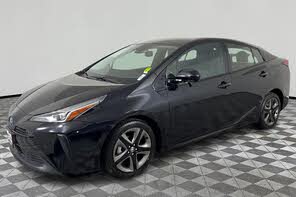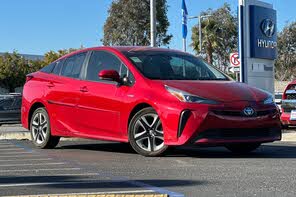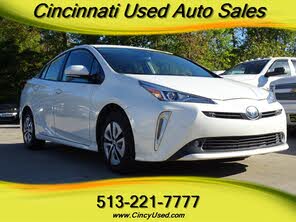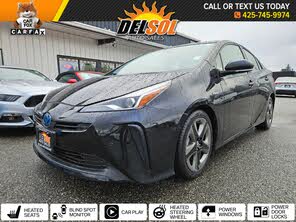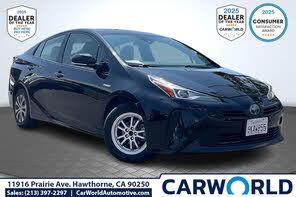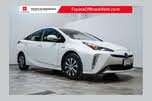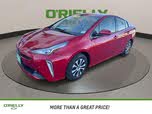2019 Honda Civic vs 2020 Toyota Prius
Overview | |
MSRP$19,550 | MSRP$24,325 |
Listings1392 | Listings121 |
Ratings & Reviews | |
User Reviews | User Reviews |
Expert reviews7.8 out of 10 | Expert reviews7.5 out of 10 |
Pros
Cons
| |
2019 Honda Civic Reviews SummaryThe tenth-generation Civic has been out since 2016, and for 2019, Honda makes only minor tweaks to this compact car's winning formula of style, value, and performance. Lots of cars are good these days, but the Civic has been consistently good for more than 45 years. This is a car that drives and feels like a more expensive car, and whether you choose a sedan, coupe, or hatchback among four engines and two transmissions—hooray for variety—the Civic rewards you. The 2019 model reminds us why. | |
2020 Toyota Prius Reviews SummaryEver heard of an eponym? It’s a brand or product that is so popular that it’s come to define its respective market. Think of Kleenex for tissues or Band-Aid for medical bandages. For hybrids, the Toyota Prius has ascended to near-eponym status. It was one of the first—and remains one of the most popular—hybrids ever made. As automakers across the industry are rolling out more hybrid models, the Prius continues to be the standard-bearer of this genre. This is largely due to the fact that the Prius is a dedicated hybrid, rather than a hybrid variant of an existing model. Throughout the industry, different companies are taking different approaches to alt-fuel vehicles, including full-electric and hydrogen fuel cell powertrains. The Prius endures as the leader in hybrid power due to a focus on fuel efficiency that doesn’t compromise on style, drivability, and versatility. So how does the Prius hold its ground as more players enter the fray? Read on to find out. | |
No video found | |
Popular Features & Specs | |
Engine2.0L 158 hp I4 | Engine1.8L 121 hp I4 Hybrid |
Drive TrainFWD | Drive TrainFWD |
Seating Capacity5 | Seating Capacity5 |
Horsepower158 hp @ 6500 rpm | Horsepower |
EV Battery Capacity | EV Battery Capacity0.7 kWh |
MPG City25 | MPG City58 |
MPG Highway36 | MPG Highway53 |
Engine | |
Engine Name2.0L 158 hp I4 | Engine Name1.8L 121 hp I4 Hybrid |
Torque138 lb-ft @ 4200 rpm | Torque |
Horsepower158 hp @ 6500 rpm | Horsepower |
DrivetrainFWD | DrivetrainFWD |
Fuel Economy | |
EV Battery Capacity | EV Battery Capacity0.7 kWh |
MPG City25 | MPG City58 |
MPG Highway36 | MPG Highway53 |
Interior | |
Seating Capacity5 | Seating Capacity5 |
Safety | |
Front Crash Overall5 | Front Crash Overall4 |
Side Crash Overall5 | Side Crash Overall5 |
Dimensions & Capacity | |
Cargo Space15.1 cu ft | Cargo Space27.4 cu ft |
Curb Weight2742 lbs | Curb Weight3010 lbs |
Height55.7 in | Height57.9 in |
Length182.3 in | Length180.0 in |
Width70.8 in | Width69.3 in |
Wheelbase106.3 in | Wheelbase106.3 in |
Maximum Payload | Maximum Payload825 lbs |
Number of doors4 | Number of doors4 |
Overview | ||
MSRP | $19,550 | $24,325 |
Listings | ||
Ratings & Reviews | ||
User reviews | ||
Expert reviews | 7.8 out of 10Read full review | 7.5 out of 10Read full review |
Pros & cons | Pros
Cons
| |
Summary | The tenth-generation Civic has been out since 2016, and for 2019, Honda makes only minor tweaks to this compact car's winning formula of style, value, and performance. Lots of cars are good these days, but the Civic has been consistently good for more than 45 years. This is a car that drives and feels like a more expensive car, and whether you choose a sedan, coupe, or hatchback among four engines and two transmissions—hooray for variety—the Civic rewards you. The 2019 model reminds us why. | Ever heard of an eponym? It’s a brand or product that is so popular that it’s come to define its respective market. Think of Kleenex for tissues or Band-Aid for medical bandages. For hybrids, the Toyota Prius has ascended to near-eponym status. It was one of the first—and remains one of the most popular—hybrids ever made. As automakers across the industry are rolling out more hybrid models, the Prius continues to be the standard-bearer of this genre. This is largely due to the fact that the Prius is a dedicated hybrid, rather than a hybrid variant of an existing model. Throughout the industry, different companies are taking different approaches to alt-fuel vehicles, including full-electric and hydrogen fuel cell powertrains. The Prius endures as the leader in hybrid power due to a focus on fuel efficiency that doesn’t compromise on style, drivability, and versatility. So how does the Prius hold its ground as more players enter the fray? Read on to find out. |
Video | No video found | |
Popular Features & Specs | ||
Engine | 2.0L 158 hp I4 | 1.8L 121 hp I4 Hybrid |
Drive Train | FWD | FWD |
Seating Capacity | 5 | 5 |
Horsepower | 158 hp @ 6500 rpm | |
EV Battery Capacity | 0.7 kWh | |
MPG City | 25 | 58 |
MPG Highway | 36 | 53 |
Engine | ||
Engine Name | 2.0L 158 hp I4 | 1.8L 121 hp I4 Hybrid |
Torque | 138 lb-ft @ 4200 rpm | |
Horsepower | 158 hp @ 6500 rpm | |
Drivetrain | FWD | FWD |
Fuel Economy | ||
EV Battery Capacity | 0.7 kWh | |
MPG City | 25 | 58 |
MPG Highway | 36 | 53 |
Interior | ||
Seating Capacity | 5 | 5 |
Safety | ||
Front Crash Overall | 5 | 4 |
Side Crash Overall | 5 | 5 |
Dimensions & Capacity | ||
Cargo Space | 15.1 cu ft | 27.4 cu ft |
Curb Weight | 2742 lbs | 3010 lbs |
Height | 55.7 in | 57.9 in |
Length | 182.3 in | 180.0 in |
Width | 70.8 in | 69.3 in |
Wheelbase | 106.3 in | 106.3 in |
Maximum Payload | 825 lbs | |
Number of doors | 4 | 4 |
The 2019 Honda Civic, while not as stylish as the 2019 Mazda3, still brought its own brand of upscale style. It featured a new gloss-black upper grille, a revised lower bumper, and larger 18-inch wheels. The sedan's silhouette was graceful, with a long hood balancing a sizable cabin and short tail, which had unique wraparound LED lights. The Touring-trim test car came with chrome door handles and LED headlights that looked like hundreds of tiny crystals. For 2019, Honda added a new Sport trim with a center-mounted exhaust and some exterior flash of the performance-oriented Si trim for thousands of dollars less.
The Civic Hatchback had a tall and aggressive rear end, while the Coupe model offered a more balanced alternative. The max-attack Civic Type R, available only in hatchback form, was essentially a race car. The interior maintained a high-tech, yet simplified theme with a central LCD screen for the tachometer and speedometer, a thin center stack with minimal buttons, and clean, linear lines. Despite a starting price under $20,000, the Civic's switchgear, buttons, and fabrics felt built to last.
The 2020 Toyota Prius retained its iconic jellybean-like shape, optimized for aerodynamics. Toyota made subtle changes to make it look more like a sedan, but it remained a hatchback. The Prius had a futuristic style, and its cabin was revolutionary with a central location for instrumentation and gauges.
Trim levels for the Prius included L Eco, LE, XLE, and Limited. The L Eco came with 15-inch alloy wheels, automatic climate control, cloth upholstery, and a 7-inch touchscreen infotainment system with Apple CarPlay, Android Auto, and Amazon Alexa compatibility. The LE trim added features like a rear windshield wiper and front-and-rear parking sensors. The XLE trim brought 17-inch alloy wheels, synthetic leather upholstery, and heated front seats. The Limited trim added adaptive, self-leveling headlights, a head-up display, and a large 11.6-inch touchscreen.


















The 2019 Honda Civic offered a range of engines. The LX and Sport sedans and coupes came with a 2.0-liter inline 4-cylinder engine producing 158 horsepower and 138 pound-feet of torque. The EX and above trims received a turbocharged 1.5-liter inline-4 with 174 hp and 162 lb-ft. The hatchback exclusively featured the turbo engine, making 180 hp in the Hatchback Sport. The Si model boosted the 1.5-liter engine to 205 hp and 192 lb-ft, while the Type R produced 306 hp and 295 lb-ft from a heavily boosted 2.0-liter engine. All models were front-wheel drive.
The Civic's engines were smooth and refined, with the turbo engine offering better mid-range acceleration. The manual transmissions were praised for their near-perfect feel, while the CVT was impressive for its smooth operation. The Civic's handling was superb, with excellent steering feel, a well-tuned suspension, and strong brakes. It was set up for sportier drivers but remained comfortable and reliable for daily commutes.
The 2020 Toyota Prius featured a 1.8-liter four-cylinder engine paired with an electric motor, producing a combined 121 horsepower and 105 pound-feet of torque. The Prius AWD-e variant added a second electric motor for the rear wheels, operating at speeds up to 43 mph. The Prius had smooth acceleration, with a seamless transition between electric and conventional power.
The Prius offered three drive modes: EV, Eco, and Power. EV mode relied solely on battery power, Power mode provided quicker acceleration with more engine noise, and Eco mode balanced performance, efficiency, and quiet operation. The unique shifter design took some getting used to, but the Engine Braking mode was helpful for mountainous regions. The Prius had engaging handling, a smooth ride, and was ideal for commuting.
The 2019 Honda Civic's interior featured a touchscreen with a volume knob and shortcut buttons, making it easier to use. The three-spoke steering wheel controlled the central display, and the analog gauges flanked the central screen. The rear seat was surprisingly roomy, with optional heated outboard seats. Cargo space was significant, with 15.1 cubic feet in the sedan's trunk, 11.9 to 12.1 cubic feet in the coupe, and up to 46.2 cubic feet in the hatchback. The center console offered ample storage, and visibility was good in all directions.
The 2020 Toyota Prius made good use of its space, with deep door pockets and a large tray area between the front seats. The front seats were spacious and comfortable, with good driver visibility. The rear seats also had plenty of space. The Prius had 50.7 cubic feet of cargo space with the rear seats folded, and 24.6 to 27.4 cubic feet with the seats up, making it one of the most spacious hybrid vehicles. The hatchback design made loading large items easy.
The 2019 Honda Civic's infotainment system was dated compared to newer Honda models. However, it redeemed itself with standard Apple CarPlay and Android Auto. The 450-watt, 10-speaker stereo on the Touring trim was improved, and Honda's LaneWatch feature was simple and effective.
The 2020 Toyota Prius came standard with a 7-inch touchscreen, Android Auto, Apple CarPlay, Bluetooth connectivity, a WiFi hotspot, and three USB ports. The Limited trim upgraded to an 11.6-inch screen with a customizable layout, but it lacked Android Auto. The Prius also offered satellite radio, HD Radio, a head-up display, and a 10-speaker JBL premium audio system. The top-center instrument panel displayed hybrid drivetrain status and other critical readouts.
The 2019 Honda Civic came standard with Honda Sensing on all trims except the Si and Type R. This included forward-collision alert, emergency braking, lane-keep assist, and adaptive cruise control. The Civic received top safety ratings from the IIHS and NHTSA, with the exception of the coupe's passenger-side frontal crash rating.
The 2020 Toyota Prius came with Toyota Safety Sense 2.0, including automatic emergency braking, forward-collision warning, lane-departure warning, adaptive cruise control, and automatic high beams. Optional features included blind-spot monitoring, rear cross-traffic alert, and active park assist. The Prius earned a five-star rating from the NHTSA and a "Top Safety Pick" from the IIHS, though it fell short of the highest rating due to "average" scores in certain tests.
CarGurus highlights
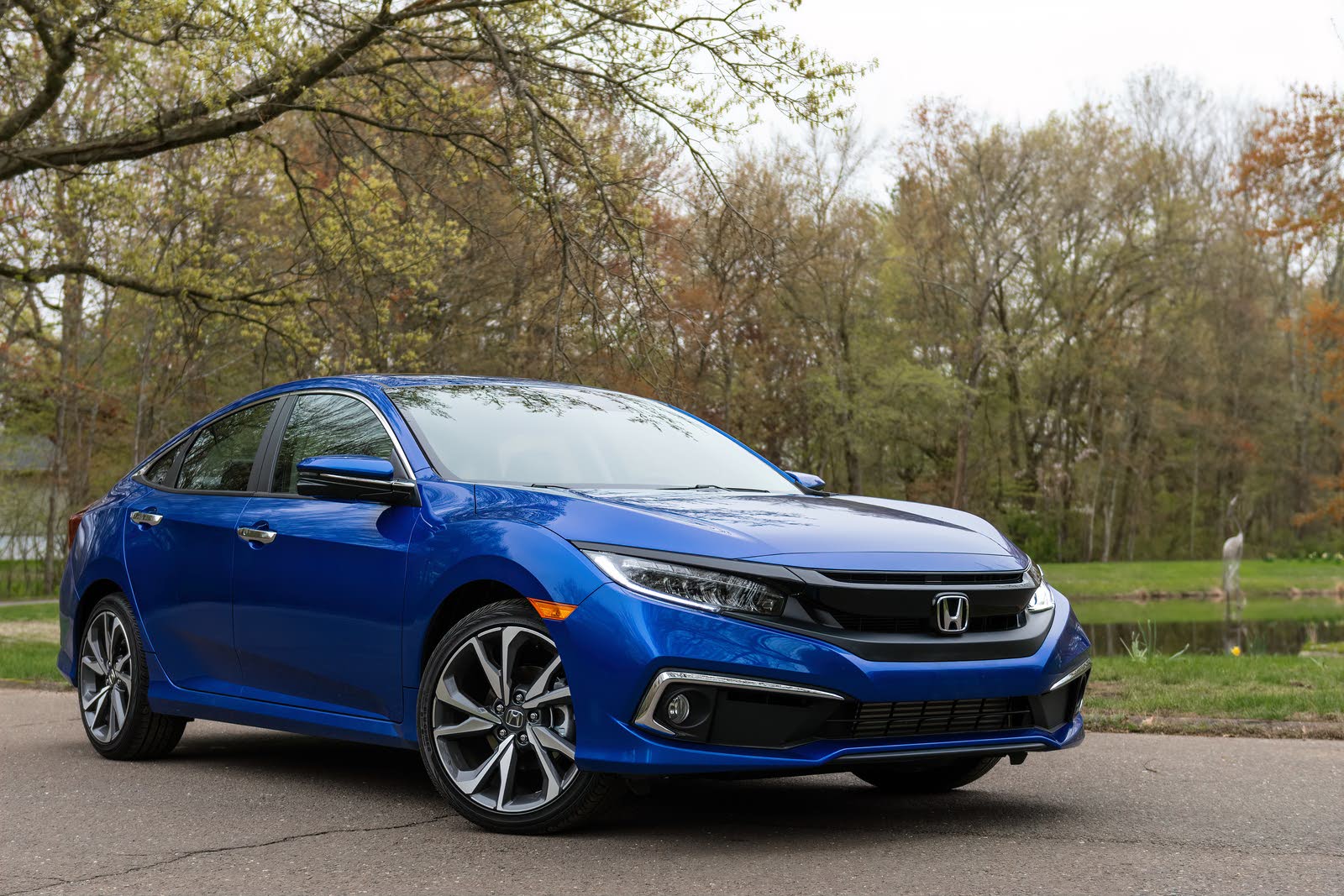
According to CarGurus experts, the overall rating for the 2019 Honda Civic is 7.8 out of 10, while the 2020 Toyota Prius scores 7.5 out of 10. Based on these ratings, the 2019 Honda Civic is the better choice, offering a more engaging driving experience, a spacious interior, and advanced safety features.
Choose the 2019 Honda Civic if:
- You want a car with sporty handling and a range of powerful engine options.
- You value a spacious interior with ample cargo space.
- You appreciate advanced safety features as standard on most trims.
Choose the 2020 Toyota Prius if:
- You prioritize fuel efficiency and a seamless hybrid driving experience.
- You need a versatile and spacious cargo area.
- You want a car with a comprehensive suite of standard safety features.
CarGurus highlights

According to CarGurus experts, the overall rating for the 2019 Honda Civic is 7.8 out of 10, while the 2020 Toyota Prius scores 7.5 out of 10. Based on these ratings, the 2019 Honda Civic is the better choice, offering a more engaging driving experience, a spacious interior, and advanced safety features.
Choose the 2019 Honda Civic if:
Shop Now- You want a car with sporty handling and a range of powerful engine options.
- You value a spacious interior with ample cargo space.
- You appreciate advanced safety features as standard on most trims.
Choose the 2020 Toyota Prius if:
Shop Now- You prioritize fuel efficiency and a seamless hybrid driving experience.
- You need a versatile and spacious cargo area.
- You want a car with a comprehensive suite of standard safety features.

By: CarGurus + AI
At CarGurus, our team of experienced automotive writers remain at the heart of our content operation, conducting hands-on car tests and writing insightful guides that are backed by years of industry experience. To complement this, we are harnessing AI to make our content offering more diverse and more helpful to shoppers than ever. To achieve this, our AI systems are based exclusively on CarGurus content, ratings and data, so that what we produce is both unique to CarGurus, and uniquely helpful to car shoppers.











